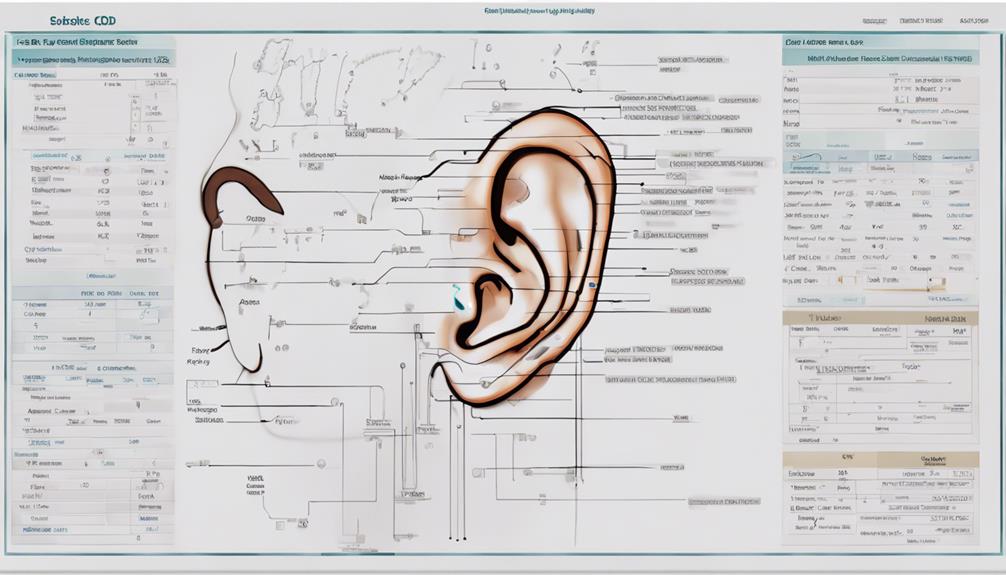Various health conditions like diabetes, heart disease, infections, neurological disorders, and medication side effects can hide or worsen hearing problems in seniors. These issues often overlap with age-related changes, making it harder to identify hearing loss early. Chronic illnesses may mask symptoms or cause confusion with other health problems, delaying treatment. If you want to understand how these hidden factors affect hearing and what you can do, keep exploring this important topic.
Key Takeaways
- Cognitive disorders like dementia and confusion can obscure recognition of hearing difficulties.
- Mood disorders such as depression or anxiety may lead to withdrawal, masking hearing issues.
- Chronic illnesses like diabetes or cardiovascular disease can cause subtle auditory changes mistaken for aging.
- Neurological conditions (stroke, MS) impair auditory processing, hiding underlying hearing problems.
- Medications for various health conditions may produce side effects like tinnitus or muffled hearing, complicating diagnosis.
Diabetes and Its Impact on Hearing Health

Diabetes can considerably affect your hearing health, often without obvious symptoms. When blood sugar levels are poorly controlled, they can cause nerve damage throughout your body, including your auditory nerves. This nerve damage hampers the transmission of sound signals from your ear to your brain, making it harder to hear clearly. Over time, high blood sugar can also restrict blood flow to the tiny blood vessels in your inner ear, leading to deterioration of the cochlea and other structures essential for hearing. Since these changes happen gradually, you might not notice any initial signs. Regular blood sugar management is indispensable to minimize nerve damage and preserve your hearing health. Staying vigilant can help catch early signs and prevent further decline. Additionally, high-frequency hearing loss is common among those with diabetes due to the damage to delicate inner ear structures.
Cardiovascular Disease and Auditory Function

Your cardiovascular health directly affects your hearing because reduced blood flow can damage the inner ear’s delicate structures. Some heart medications may also contribute to hearing difficulties as side effects. Understanding these links can help you better manage both your heart and hearing health.
Blood Flow and Hearing
Since blood flow is vital for delivering oxygen and nutrients to the inner ear, cardiovascular disease can considerably impact hearing health. Poor vascular health leads to reduced blood circulation, which deprives the delicate structures responsible for hearing of essential nutrients. When blood flow diminishes, the inner ear’s hair cells and auditory nerve fibers can suffer damage or degeneration, resulting in hearing loss. Maintaining good vascular health through regular exercise, a balanced diet, and managing blood pressure supports healthy blood circulation. This, in turn, helps preserve auditory function. Recognizing that compromised blood flow can mask hearing issues emphasizes the importance of cardiovascular health in preventing hearing decline. Protecting your vascular system is a key step toward maintaining hearing health as you age. Understanding how blood flow affects hearing underscores the link between cardiovascular health and auditory function.
Heart Medications Impact
Many heart medications used to treat cardiovascular disease can unintentionally affect hearing. These medication interactions may cause dizziness, tinnitus, or muffled sounds, making it harder to notice hearing issues. Lifestyle factors, such as smoking or poor diet, can worsen these effects. It’s important to stay aware of how your medications might impact your auditory health. Engaging in creative practice can also serve as a helpful way to manage stress and promote overall well-being. Consider these points: – Some diuretics can damage the inner ear – Beta-blockers may cause dizziness affecting balance – Certain statins could contribute to hearing loss – Combining medications increases risk of side effects – Regular check-ups help monitor auditory changes
Cognitive Decline and Hearing Loss Symptoms

Cognitive decline can often blur the signs of hearing loss, making it harder to recognize the underlying issue. You might notice memory loss or confusion, which can overshadow hearing difficulties. Mood changes, such as irritability or withdrawal, may also be mistaken for depression or other mental health conditions, rather than hearing problems. Because both cognitive decline and hearing loss affect communication and awareness, they can mask each other’s symptoms. This overlap can delay diagnosis and treatment, leading to further confusion and frustration. If you or a loved one shows signs of memory loss or mood swings, it’s essential to contemplate hearing health as part of the overall assessment. Addressing both issues early can improve quality of life and prevent further cognitive or auditory decline. Additionally, understanding the importance of vetted hearing aids and protective measures can help mitigate some of these challenges.
Age-Related Changes and Hidden Hearing Difficulties

As you age, natural changes in your ears and brain can cause hearing difficulties that are often hard to detect. Age-related changes, like loss of hair cells in the cochlea or slowed neural processing, contribute to hidden hearing difficulties. These issues may not be obvious but can affect your ability to follow conversations, especially in noisy environments. You might notice you’re missing parts of conversations or straining to hear, but attribute it to fatigue or distraction. Keep in mind:
As you age, subtle changes in your ears and brain can make hearing harder without obvious signs.
- Reduced sensitivity to high-frequency sounds
- Difficulty distinguishing speech from background noise
- Slower auditory processing
- Decreased ability to localize sounds
- Subtle changes that go unnoticed but impact communication
- The presence of specialized hearing devices can sometimes mask or compensate for these difficulties, making early detection even more crucial.
Medication Side Effects That Affect Hearing

Certain medications can inadvertently impact your hearing, making it harder to detect or understand sounds. Some drugs cause side effects like ringing in the ears (tinnitus) or temporary hearing loss. Drug interactions may amplify these effects, especially when you’re taking multiple medications. For example, certain antibiotics, diuretics, and chemotherapy drugs are known to affect auditory function. It’s important to be aware of medication side effects and discuss any hearing changes with your doctor. Not all side effects are immediate, and some may develop over time. If you notice muffled hearing, dizziness, or ringing, don’t ignore these signs. Your healthcare provider can review your medications and adjust them if necessary to prevent further hearing issues.
Neurological Disorders and Auditory Processing

Neurological disorders can profoundly affect how seniors process auditory information, even if their ears are functioning normally. These disorders disrupt auditory processing pathways in the brain, leading to difficulties understanding speech, especially in noisy environments. You might notice that your loved one struggles to follow conversations or frequently asks for repeats. Common neurological conditions impacting auditory processing include:
Neurological disorders can impair auditory processing, causing speech comprehension issues despite normal hearing.
- Stroke affecting auditory centers
- Parkinson’s disease impairing sound interpretation
- Multiple sclerosis disrupting neural signals
- Brain tumors compressing auditory pathways
- Dementia causing confusion with sounds
Recognizing these issues is essential because hearing tests alone won’t reveal problems caused by neurological disorders. If auditory processing seems impaired despite normal hearing, consult a specialist to evaluate neurological health and develop targeted strategies for better communication.
Chronic Infections and Inner Ear Health

Chronic infections can cause symptoms that mimic hearing loss, making it hard to identify the true issue. These infections also risk damaging the inner ear, which can worsen hearing problems over time. When chronic conditions are present, they often complicate diagnosis, delaying effective treatment. Additionally, certain infections may involve oral health, further impacting hearing health if left untreated.
Infection Symptoms Overlap
Since infections can cause symptoms like dizziness, ringing in the ears, and balance issues, they often overlap with signs of inner ear problems common in seniors. Viral outbreaks can trigger inner ear inflammation, making it hard to distinguish infection from hearing loss. Additionally, antibiotic effects might mask or worsen symptoms, complicating diagnosis. Be aware of these signs:
- Persistent dizziness or vertigo
- Tinnitus or ringing in the ears
- Balance problems or unsteadiness
- Ear pain or fullness
- Recurring infections despite treatment
Because symptoms overlap, it’s easy to overlook infections as the root cause. This can delay proper treatment for both the infection and underlying hearing issues. Recognizing these signs early helps ensure timely intervention and reduces the risk of long-term damage.
Inner Ear Damage Risks
Persistent infections can cause lasting damage to the inner ear, increasing the damage risks that lead to hearing loss and balance issues over time. When infections become chronic, they can harm the delicate structures inside your inner ear, affecting your ability to hear clearly and maintain equilibrium. Recognizing these risks is essential for early intervention. Damage risks vary depending on infection severity and duration. Here’s a quick overview:
| Infection Type | Damage Risks | Potential Outcomes |
|---|---|---|
| Bacterial | High | Sudden hearing loss |
| Viral | Moderate | Balance problems |
| Fungal | Variable | Persistent dizziness |
Protect your inner ear by seeking prompt treatment for infections, reducing long-term damage risks.
Chronic Conditions Complicate Diagnosis
When infections become ongoing, diagnosing hearing issues can become especially challenging because the symptoms often overlap with other age-related conditions. Chronic infections, like labyrinthitis or otitis media, can subtly impair hearing without obvious signs, making it hard to pinpoint the cause. Additionally, mental health factors, such as anxiety or depression, may mask or exaggerate hearing difficulties. Nutritional factors also play a role, as deficiencies in vitamins like B12 or zinc can impact inner ear health. These overlapping factors can delay proper diagnosis and treatment, worsening overall health. Be aware of these signs:
- Persistent dizziness or imbalance
- Changes in mental health affecting perception
- Nutritional deficiencies impacting ear function
- Overlapping symptoms with other conditions
- Difficulty differentiating infection symptoms from age-related decline
Furthermore, low light office plants like the snake plant or pothos can help improve indoor air quality, potentially supporting overall health and well-being, including ear health.
Sleep Disorders and Their Influence on Hearing Perception

Sleep disorders can markedly influence hearing perception in seniors by disrupting the delicate balance of auditory processing. Conditions like sleep apnea cause repeated breathing interruptions, leading to oxygen deprivation that can damage inner ear structures and impair hearing. REM disturbances, common in sleep disorders, interfere with the brain’s ability to process auditory signals effectively. Poor sleep quality affects neural pathways involved in hearing, making it harder to distinguish sounds or understand speech. As a result, seniors may experience hearing difficulties that are mistaken for other issues or overlooked altogether. Recognizing the connection between sleep disorders and hearing health is vital, as addressing sleep problems may help improve auditory function and prevent further deterioration. Additionally, sleep deprivation can exacerbate existing hearing issues by further impairing neural processing.
Frequently Asked Questions
How Can Mental Health Issues Influence the Perception of Hearing Problems?
Mental health issues can markedly influence how you perceive hearing problems. Psychological barriers like anxiety or depression may make you less aware of hearing loss, while cognitive biases can lead you to dismiss or ignore warning signs. These factors can distort your perception, causing you to overlook hearing difficulties or attribute them to other causes. Recognizing how mental health impacts your perception helps you seek timely help and address both issues effectively.
Are There Specific Lifestyle Factors That Obscure Hearing Loss Diagnosis?
Oh, the grand illusion of clarity! Your lifestyle choices, like poor dietary habits and lack of physical activity, can cleverly hide hearing issues. You might dismiss subtle signs, attributing them to fatigue or age, while your unbalanced diet and sedentary life quietly sabotage your hearing health. These factors mask the problem, delaying diagnosis. Stay active and eat well—don’t let your lifestyle sabotage your ability to truly listen.
What Role Does Nutrition Play in Managing Hearing Health in Seniors?
Nutrition plays a essential role in managing hearing health in seniors. You should focus on a balanced diet rich in vitamins and minerals, as diet and supplements can support cochlear health and nerve function. Be mindful of nutritional deficiencies, like vitamin B12 and magnesium, which may contribute to hearing loss. Proper nutrition helps reduce inflammation and supports overall ear health, making it easier to detect and manage hearing issues early.
Can Visual Impairments Mask Underlying Auditory Issues?
Yes, visual impairments can mask underlying auditory issues because vision masking and visual interference often cause you to rely more on sight. When your vision is compromised, you might not notice subtle hearing difficulties, as you focus on what you see. This reliance can delay detection of hearing problems, making it essential to assess both senses thoroughly, especially in seniors, to avoid missing early signs of hearing loss.
How Do Social Isolation and Loneliness Affect Hearing Health Awareness?
Social isolation and loneliness can cloud your awareness of hearing issues like a thick fog, making it harder to notice early signs. When you lack social engagement and community support, you might ignore subtle hearing difficulties, believing they’re just part of aging. Staying connected keeps you alert and helps you recognize problems early, encouraging timely care. Embracing community and social activities boosts your hearing health awareness and overall well-being.
Conclusion
If you notice subtle hearing issues, don’t overlook underlying health conditions like diabetes or medication side effects. For example, John, a 68-year-old with diabetes, initially dismissed his muffled hearing, but addressing his blood sugar improved it. By staying aware of these hidden factors, you can catch problems early and maintain better hearing health. Regular check-ups and open conversations with your doctor can make a real difference in preserving your hearing.











